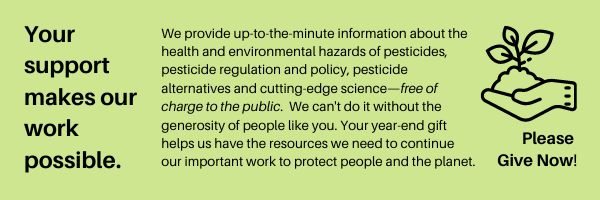24
Dec
Beyond Pesticides Wishes You A Healthy New Year

(Beyond Pesticides, December 24, 2020) We at Beyond Pesticides wish our members, supporters, and collaborators all the best for the holiday season and new year. We look forward to working with you in the new year to meet the serious environmental and public health challenges with truly organic solutions.
Our accomplishments are your victories. We are seeing the outcomes in communities across the country—the adoption of organic land management policies and practices that eliminate toxic pesticides, protect children, pets, and families, and protect the local ecology.
With your support of Beyond Pesticides, we strive to reverse the destructive environmental and public health path that we’re on and advance the adoption of organic practices and policies that respect life.
Meeting the Challenges Ahead
Beyond Pesticides is working toward the societal transition to practices and policies that eliminate toxic pesticide use. This work intersects with daily decisions made in households, school districts, and municipal and state governments, as well as at the federal level, on crucial issues relating to the health of children, families, and workers, the climate crisis, and biodiversity. Our work helps to inform practices and policies that go to the core of public health protection and the sustainability of ecosystems. Beyond Pesticides has a vibrant program of information services, policy advocacy, and hands-on support to communities, local organizations, and people, as we advocate and teach organic practices.
During these challenging times, as the pandemic emerged, we have keyed into timely practical issues of safe disinfectants (with a new webpage and factsheets) that protect without exacerbating the very conditions caused by Covid-19—respiratory, neurological, and immunological illness—at the same time that we participate in virtual community hearings and meetings to advance organic land management that protects people and communities. This work aligns with our work to assist with informed decision making, ensuring the accessibility of important scientific findings through our databases (Pesticide Gateway and Pesticide-Induced Diseases Database), and Daily News tracking of information that is a tool for effective action.
Our broader strategic work continues, as we went virtual with our community-based program across the country to transition land management to organic practices. Our information and community support continue to be an important source of independent scientific and practical information to inform the transition away from toxic pesticides in the face of dramatic declines in environmental quality, the climate crisis, and the insect apocalypse. We will continue to advocate for community policies and practices that embrace transparent decision making with public participation, and organic compatible materials for land and building management.
At this pivotal time in our country’s history, we are working to not only reverse bad decisions that have ignored science over the last four years, but to institute broader changes that affect a shift, in both policy and practice, away from pesticide use and to organic land management. We are committed to advancing this vision with the Biden administration. Outside of the opportunities for more protective decisions at the federal level, in the next year, we will continue to seek the adoption of model, local, organic land management policies and/or practices in at least a dozen new communities, adding to the 41 communities in 22 states where we are currently working across the country—as we strive to see these models expand to every community in the nation.
Our program bridges policy and practice—reframing strategies that simply go after the endless list of toxic chemicals—and advancing a holistic approach that recognizes complex biological communities, the importance of soil microbiota, trophic effects, and ecosystem services in the context of broader human health and environmental protection. This is the framework we adopt as we work at the local, state, and federal level in advancing policy reform. It is especially important as national attention is focused on meaningful systemic change that addresses disproportionate risk to people of color communities and workers, from landscapers to farmworkers.
Year in Review
Beyond Pesticides’ program supports a clear message: End toxic pesticide use and embrace organic practices and policies that respect the power of nature to heal— in the face of devastating and destructive toxic chemical-dependency. This past year has again elevated important public discourse on the threats that pesticides pose to health and the environment.
Challenging Fraudulent and Misleading Advertising in the Market 
We filed lawsuits against two major corporations for misleading the public on the safety of their products and the adverse impact they have on the environment. TruGreen—a nationwide chemical-intensive lawn treatment company—and ExxonMobil, an oil and gas producer of petrochemicals that are the basis for pesticides. As a result of the litigation, TruGreen agreed to remove language from their advertising that misrepresented the safety of the products they use. We continue to challenge Exxon’s misrepresentation of its contribution to mitigating the climate crisis while petroleum is used to produce pesticides and synthetic fertilizers that contribute significantly to this impending existential threat.
Furthermore, we sued the U.S. Environmental Protection Agency (EPA) for its registration of Dow Chemical’s herbicide Enlist Duo, comprised of two active ingredients, 2,4-D, and glyphosate. This case challenges the “new use” that allows direct spraying over-the-top of crops engineered to resist both pesticides.
Lastly, we approached the organic garden product manufacturer Dr. Earth to explore with them their misleading approach to product substitution absent a more robust explanation of and support for organic management practices. We sent a friendly letter (not an intent to sue) with background on Beyond Pesticides’ long commitment to organic and said that we have “become aware of certain labeling and marketing practices of Dr. Earth, Inc. which may create mistaken impressions about your products and lead to consumer confusion” about organic management being simply a product replacement strategy rather than a holistic strategy to support and nurture soil health and utilize cultural practices.
To learn more about our lawsuits and settlements, please read the Lawsuits & Settlements section on Beyond Pesticides’ “A Year in Review” webpage.
The Science Behind the Impact of Disproportionate Risks
We embraced the teachable moment of national recognition that there are racial disparities in the distribution of harm, given exposure patterns associated with those on the frontlines, and connected the exposure of pesticides to the exacerbating of risk factors—respiratory illness, immune and neurological illness, as well as others. The concept of disproportionate harm has been elevated in the public mind as people nationwide have seen numerous news reports that show people of color, as essential workers with greater exposure to Covid-19 and elevated rates of comorbidities are experiencing rates of illness and death far greater than their percentage of the population. This awareness opens opportunities for advancing policies that address the underlying causes of environmental racism and another seemingly broader awareness of the need for systemic change to address the symptoms of the inequities that people of color experience.
`To learn more about disproportionate risks impacting vulnerable communities, please read the Disproportionate Risks section on Beyond Pesticides’ “A Year in Review” webpage.
Growing Effective Organic Solutions and Strategies
 Our efforts focus on shifting communities’ approach to land and building management to address critical health and environmental issues. To move this goal forward, we carry out activities that advance a holistic awareness of the complex adverse effects and unknowns associated with pesticide-dependent management practices and policies. On a daily basis, we bring attention to and broader understanding of the actual hands-on practices that are protective of health and in sync with nature.
Our efforts focus on shifting communities’ approach to land and building management to address critical health and environmental issues. To move this goal forward, we carry out activities that advance a holistic awareness of the complex adverse effects and unknowns associated with pesticide-dependent management practices and policies. On a daily basis, we bring attention to and broader understanding of the actual hands-on practices that are protective of health and in sync with nature.
In addition to our work to educate on the ecological and health benefits of organic practices, we have developed a fact sheet in response to those who argue that organic land management of parks and playing fields are too costly. The economic viability of organic agriculture has certainly been established with the growth of a $60 billion industry.
To learn more about the shift towards organic practices, including information about the National Organic Standards Board (NOSB), our watchdog arm, OrganicEye, and our Stonyfield PlayFree and Organic Community Land Management Program training, please read the Solution and Strategies section on Beyond Pesticides’ “A Year in Review” webpage.
Community Action: Local policies and practices
Local land management and ordinances across the country are just as much about preventing hazards and filling an increasing gap in protection from regulators, as it is about recognizing the viability of sound land management practices. These practices do not use toxic chemicals and result in a healthier and more resilient plant life that stands up to stress and is less reliant on limited water resources.

Beyond Pesticides is well-positioned to effect changes in communities that serve as a model for other communities. We continue to develop the informational tools that support change agents, whether they are advocates or elected officials. We are also able to provide the technical skills to land managers, which ensure effective implementation of policies and plans for sustainable and organic land management.
To learn more about Beyond Pesticides’ community action, including cities/states participating in organic land management and our Hawai’i food hub program, please read the Community Action section on Beyond Pesticides’ “A Year in Review” webpage.
Action of the Week: Monitoring and Responding to Government Action
Action of the Week (AOTW) provides our network with one concrete action that can be taken each week to have our collective voice heard to stop governmental actions that adversely affect public,  worker, and environmental health, increase overall pesticide use or undermine the advancement of organic, sustainable, and regenerative practices and policies. With almost 25,000 subscribers, the actions can generate between 2,000 and 4,000+ participants weekly.
worker, and environmental health, increase overall pesticide use or undermine the advancement of organic, sustainable, and regenerative practices and policies. With almost 25,000 subscribers, the actions can generate between 2,000 and 4,000+ participants weekly.
The top five AOTWs with the most contributions include:
- Tell Congress that EPA Needs to Listen to Science, not Pesticide Manufacturers and Biotech Companies (10/05/2020)
- Tell USDA to Strengthen Organic Enforcement and Allow More Time for Public Comments (09/28/2020)
- Tell the National Organic Standards Board to Support Core Organic Values (09/21/2020)
- Ask Congress to Help Farmers of Color and Small and Medium-Sized Farms Selling in Local Food Markets (09/14/2020)
- Ban the Wood Preservative Pentachlorophenol (09/08/2020)
To see all AOTW for 2020, please visit Beyond Pesticides’ Action of the Week webpage.
 Framework for Policy Change: Bringing technical knowledge to local deliberations
Framework for Policy Change: Bringing technical knowledge to local deliberations

Beyond Pesticides issues unique reports to support local activism to move changes in practices and policies that eliminate pesticide use. With this information and the model policy that we have created, local people nationwide have successfully moved change.
Beyond Pesticides issues unique reports to support local activism to move changes in practices and policies that eliminate pesticide use. With this information and the model policy that we have created, local people nationwide have successfully moved change. Furthermore,
To learn more about our framework for policy change, including our reports and the Biden transition plan, please visit read the Framework for Policy Change section on Beyond Pesticides’ “A Year in Review” webpage.
Science & Advocacy Resources: Information for Action and Unique databases
Beyond Pesticides’ website serves as a hub for a range of regulatory and policy advocacy, information services to people nationwide and around the globe. The information we provide performs the unique function of providing hands-on information and strategy. We create a public record on scientific decisions that are being undermined by poor public policy that allows hazardous pesticide use, despite the availability of alternatives.
Some of our most recently added or updated webpages include:
- Children and Schools
- Golf Courses
- Healthy Hospitals
- Pesticide-Free Holidays: Christmas; New Year
- Pesticide-Induced Diseases Relational Database Search
- Pesticide Topic Submission Portal
- Pets
- Safer Disinfectants and Sanitizers
Furthermore, Beyond Pesticides has a high degree of involvement in pesticide policy and action, commenting on regulatory decisions—from GMO pesticide tolerances to endangered species pesticide encounters—and implementing or guiding pesticide policy regulations—from antimicrobial sock masks to mosquito control.
To learn more about Beyond Pesticide’s regulatory action/comments and information resources, including our Pesticide Gateway, Pesticide Induced Disease Database, ManageSafe, please visit read the Advocacy and Science section on Beyond Pesticides’ “A Year in Review” webpage.
Campaigns and Fundraisers
Beyond Pesticides would like to thank all of our donors and supporters for their contributions over the year. Without your help, our mission would not be possible.

Members and Donors. Our program relies on the generous contributions of our supporters and we are extremely grateful!
Natural Grocers Campaign. As a part of an important partnership, Natural Grocers kicked off a month-long fundraising campaign in September 2020, with the goal to raise $100,000 in September for Beyond Pesticides’ Organic Community Land Management Program. With a donation and organic pledge campaign, Natural Grocers’ partnership with Beyond Pesticides surpassed the goal and raised $125,000! These resources will be plowed back into our community work to grow the transition to organic land management!
To learn more about Beyond Pesticide’s campaigns and fundraisers, please visit read the Campaign and Fundraisers section on Beyond Pesticides’ “A Year in Review—2020” webpage.
Many Thanks to You!
We would like to give special thanks to you, our Daily News Blog readers. We are taking a break. Daily News and Action of the Week will be back on January 4, 2021. In the meantime, please consider a year-end gift to Beyond Pesticides—we can’t do our work without you! See you in 2021!












